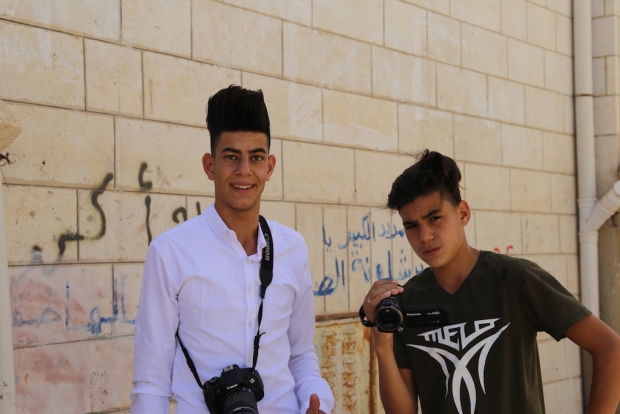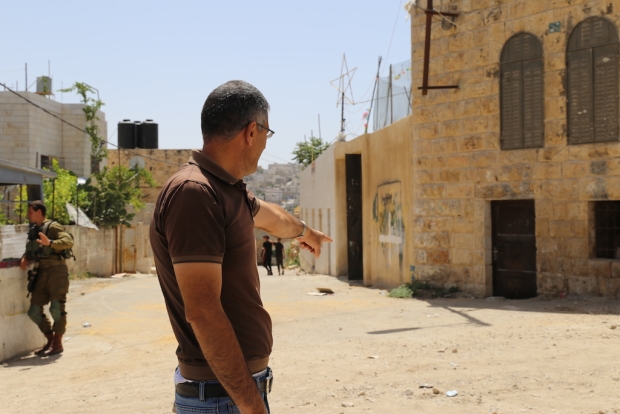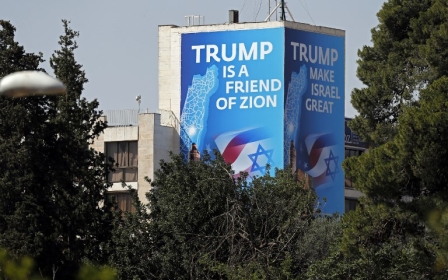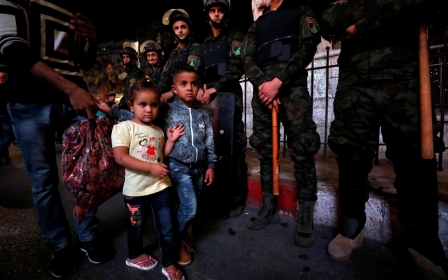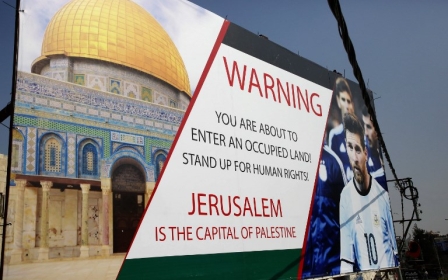Palestinian activists slam draft law prohibiting filming of Israeli forces
HEBRON, Occupied West Bank - On 2 June, Aaref Jaber witnessed Israeli forces shooting and killing 37-year old Palestinian construction worker Rami Wahid Sabarneh. The incident took place just down the street from his home, which sits east of the Ibrahimi Mosque (also known as the Cave of the Patriarchs) in the southern West Bank city of Hebron. He filmed the entire thing.
“A soldier saw me film the shooting and he approached me, telling me to delete the video," Jaber, a member of the Hebron-based Human Rights Defenders (HRD) group, told Middle East Eye.
"When I refused, he pushed me up against a wall and put his gun to my head. He said ‘Did you understand? Or should I put this bullet in your head so you can understand?’”
For years, the Israeli government has targeted Palestinians and their supporters through a series of highly controversial laws. But the latest bill discussed by Israeli lawmakers has local and international activists and journalists alike fearing for the future.
We started off by giving cameras to 10 families and trained them on how to use their cameras as a form of nonviolent resistance
- Badee Dweik, Human Rights Defenders
The proposal, which was put forward late last month with the support of right-wing Israeli Defence Minister Avigdor Lieberman, seeks a ban on filming or photographing Israeli soldiers while on duty.
The bill calls for a maximum five-year prison term for anyone photographing, recording or distributing Israeli army activity on social media with “the aim of hurting the soldiers’ spirit,” and up to 10 years for anyone convicted of “seeking to harm national security”.
Israeli newspaper Haaretz reported on Sunday that despite concerns from Israeli Attorney General Avichai Mandelblit that the bill was “problematic from a constitutional standpoint,” it was still approved by the Ministerial Committee for Legislation.
Although the committee reportedly called for substantial changes to be made to the bill before it reaches the Knesset plenum, Palestinian activists say they’re sceptical.
“Just the fact that they are considering this bill in the first place is extremely dangerous,” Badee Dweik, co-founder of the HRD group that operates in Hebron, told MEE.
“They have not even passed this bill, and we are already feeling the effects of it here in Hebron,” Dweik said. Over the past month, the activist explained, at least a third of the nearly 20-member group have been verbally and physically assaulted by Israeli forces for their documentation work.
‘The camera does not lie’
In the Old City of Hebron, where some 800 Israeli settlers live under the protection of the Israeli military, human rights violations are a daily occurrence.
Following the Ibrahimi Mosque massacre in 1994, the old city was divided into Palestinian and Israeli-controlled areas, known as H1 and H2. In H2, a thousand Israeli soldiers and 20 military checkpoints restrict Palestinians' every move.
In 2014, Dweik and his friends who live in and around the Old City launched HRD with the purpose of documenting the daily violations and exposing them to the international community. They focused on the H2 area.
Essential to the group’s work is the Capturing Occupation Camera Project, which it launched in 2015.
“We started off by giving cameras to 10 families and trained them on how to use their cameras as a form of nonviolent resistance,” Dweik told MEE.
Since the project was launched, the organisation has grown significantly from its core group of activists to dozens of others, including children, equipped with cameras and mobile phones.
“Once we saw the effectiveness of the project, we began training around 30 children in four at-risk schools in the H2 area on how to document the occupation,” he said, adding that the children were also taught nonviolent ways to protect themselves during confrontational situations and educated on their rights in case of arrest.
“The camera does not lie. It reflects only the truth, and is a peaceful weapon that we use against their violence,” Dweik said.
The fatal shooting of 20-year old Palestinian Abdel Fattah al-Sharif, who was lying incapacitated on the ground after stabbing a soldier in Hebron, showed how essential audio-visual documentation is when it comes to holding Israeli soldiers to account.
The moment Elor Azaria, an Israeli soldier, put a bullet into Sharif’s head was caught on camera by Imad Abu Shamsieh, one of the cofounders of HRD. The footage took the international community by storm and was vital to Azaria's prosecution in court.
“I was drinking coffee in the morning with my wife Fayza when we heard commotion on the street,” 47-year-old Abu Shamsieh told MEE.
“My wife, who is also part of the Human Rights Defenders, grabbed the camera and we went down to film what was going on.”
After capturing the footage, Abu Shamsieh immediately sent it out to HRD, Israeli NGO B’Tselem, where he was a volunteer, and several other media organisations.
Following the release of the video, Abu Shamsieh and his family faced an onslaught of threats from Israeli forces and settlers.
“Just six hours after I published the video, Israeli intelligence officers came to my house and arrested me for interrogation. We were harassed by soldiers and punitively detained for long periods of time at checkpoints,” he said.
According to Abu Shamsieh, Israeli settlers would throw Molotov cocktails at his home and verbally abuse his wife and daughter in the street. They even once tried to stab his 16-year-old son with a screwdriver. Nearby Israeli soldiers did not intervene.
“They circulated a photo of me calling for my death. And when the case against Elor Azaria was taken to court, the soldiers came to my house and threatened me if I went to testify.”
Abu Shamsieh refused to change his testimony. He believes that if it hadn't been for his video and subsequent statement to the court, Azaria would never have been sentenced (the soldier only ended up serving eight months in prison).
“I never imagined that the video would get so much attention and result in what it did,” Abu Shamsieh told MEE. “If I didn’t take my camera with me that morning, no one would have believed my testimony.”
“Despite all the threats and abuse my family and I have faced as a result of our work, my wife and I will continue doing what we do and teaching our kids how to use the camera. It is the only tool we have to defend ourselves.”
Threats, assault, and arrest
Abu Shamsieh’s experience of abuse at the hand of Israeli soldiers is not unique to him and his family.
Almost every member of HRD has been subjected to verbal and physical abuse at the hands of Israeli forces.
In 2017, Israeli forces raided Dweik’s home more than four times, threatening him and telling him to stop his work. On one occasion, they smashed his camera. His 12-year-old son Abdullah was arrested the same year while he was filming soldiers with a camera his father gave him.
The past month, however, has seen an uptick in threats targeting the activists and their families, which Dweik attributes to the buzz surrounding the new bill.
During the Muslim holy month of Ramadan, activist Malika Qafisheh was confronted by soldiers outside the Ibrahimi Mosque for filming them. They broke her phone.
On the Eid al-Fitr holiday marking the end of Ramadan, another activist, Ziad Dweik, was detained without reason by soldiers for nine hours on his way to visit his sister in the Old City. Upon intervention by HRD’s lawyers, he was released - only to be called in for interrogation by Israeli intelligence shortly afterwards.
Badee Dweik told MEE that earlier this month he was stopped at various checkpoints in the old city three times in less than 24 hours. Each stop lasted for at least 30 minutes.
“A trip that should have taken me seven minutes took me more than an hour. It’s clear that they are targeting us more now because of this new bill,” Dweik said.
The latest victim of the intensified attacks was Aaref Jaber, the HRD activist who was held at gunpoint after filming a shooting earlier this month.
Shortly after the incident, Jaber rushed home and sent the videos to Dweik and the rest of the group. Within minutes, Israeli intelligence officers arrived at Jaber's house and deleted the videos from his phone.
“They then asked me to go outside, so I did without resisting, and they immediately put me in a headlock and started beating me,” Jaber said.
When his wife and kids went to pull the soldiers off him, the soldiers pushed them, causing his wife to fall to the ground and sprain her shoulder.
Jaber’s 14-year-old son Ameer pulled out his phone to film the assault, as his father had taught him to do in events like this. The soldiers grabbed the phone and smashed it.
Jaber believes attacks on him and other camera-wielding Palestinain activists "show how much the occupation is scared of our work”. While he remains resolute, he also worries that Israel's proposed new bill will see these attacks become worse and more frequent.
A ‘draconian’ piece of legislation
In its report on Sunday, Haaretz cited a senior member of the coalition behind the bill as saying that an agreement was reached “whereby the proposed law will call for a ban on interfering with Israel Defense Forces soldiers in the line of duty, but there will not be a total prohibition on filming and documenting such activities”.
The alleged agreement, however, means nothing to Dweik, Jaber, and Abu Shamsieh. All three expressed concerns that the vague language of the bill would serve as a cover for soldiers to abuse their powers.
“What does ‘interfering with soldiers duties’ mean, exactly?” Dweik asked. “It can mean anything that the soldiers want it to mean.” Jaber nodded in agreement.
They have their guns which they say they use to protect their people. But we have our cameras, which we use to protect our people
- Aaref Jaber, Human Rights Defenders
“That is why this bill is so dangerous,” Dweik said.
In a statement to MEE, B’Tselem, which regularly releases videos of army violations in the occupied territory, criticised the Israeli government over what it called a “draconian” piece of legislation.
“If the government finds the occupation too embarrassing to even be visibly documented, it should work to bring it to an end - not go after photographers,” B’Tselem said, adding that “either way, the documentation of this reality will continue”.
While the bill will likely affect the work of journalists and groups like B’Tselem, the activists of HRD expressed concerns that the brunt of the legislation would be felt by grassroots activists and ordinary citizens.
“This is a racist law that attempts to silence ordinary Palestinians and activists like us who choose to resist the occupation and attempt to liberate our people nonviolently,” Dweik told MEE.
“If we do not do this work, how will the international community know about what goes on here?” he asked.
Pointing to the cameras and shattered phone in his son Ameer's hand, Jaber said defiantly: “They have their guns which they say they use to protect their people. But we have our cameras, which we use to protect our people.”
New MEE newsletter: Jerusalem Dispatch
Sign up to get the latest insights and analysis on Israel-Palestine, alongside Turkey Unpacked and other MEE newsletters
Middle East Eye delivers independent and unrivalled coverage and analysis of the Middle East, North Africa and beyond. To learn more about republishing this content and the associated fees, please fill out this form. More about MEE can be found here.


